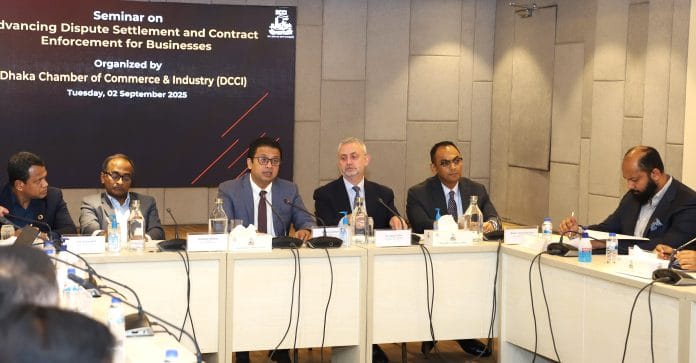Legal experts, government officials, and business leaders have called for the urgent adoption of alternative dispute resolution (ADR) mechanisms, including specialised commercial courts and arbitration, to ease the burden on judiciary and create a more investment-friendly business environment.
Speaking at a high-level seminar titled “Advancing Dispute Settlement and Contract Enforcement for Businesses”, organized by the Dhaka Chamber of Commerce & Industry (DCCI) in the capital, participants emphasized that the traditional court system is overwhelmed, causing delays that are negatively impacting trade, investment, and economic growth.
“Bangladesh is one of the most densely populated countries, and with increasing commercial activity, court dockets are becoming unmanageable,” said Taskeen Ahmed, president of DCCI, in his opening remarks.
“Prolonged legal processes not only discourage foreign direct investment (FDI) but also impede the overall ease of doing business,” he added.
Ahmed pointed out that around four million cases remain pending across various levels of the judiciary. A significant portion of these involve commercial disputes, which, if unresolved, pose risks to both domestic and foreign investors.
Despite the enactment of the Arbitration Act in 2001, he noted, it has seen limited implementation and remains underutilized.
To address these issues, Ahmed proposed the establishment of a dedicated Commercial Court, staffed by experienced judges and supported by an updated legal framework. “Efficient dispute resolution will enhance investor confidence, unlock capital, and support sustainable economic growth,” he said.
Government and International Partners Signal Reform
Addressing the event as the chief guest, Mahbubur Rahman, commerce secretary, acknowledged that while some steps have been taken—including the introduction of the Arbitration Act—more needs to be done.
He disclosed that a draft proposal to establish a Commercial Court is currently under review and could be finalized within a month.
He also stressed the importance of raising awareness about arbitration and promoting its usage across the country.
Michael Miller, ambassador and head of delegation of the European Union to Bangladesh, underscored the EU’s collaboration with the government in reforming the legal and business landscape.
“As Bangladesh approaches graduation from LDC status and aims to diversify its exports, the establishment of commercial courts will be vital to attracting and retaining foreign investment,” he said.
Miller also revealed that European companies are keen to invest in logistics and shipping, but unresolved legal risks remain a barrier. He urged the government to prioritize legal reforms and strengthen arbitration mechanisms to counter investment stagnation.
Legal Experts, Institutions Call for Structural Overhaul
Former DCCI President and legal expert Barrister Md. Sameer Sattar delivered the keynote presentation, highlighting the dire state of contract enforcement in Bangladesh.
“According to the World Bank’s earlier Doing Business report, Bangladesh ranked 189th out of 190 countries in enforcing contracts,” he said. As of March 2025, nearly 25,000 cases are pending in financial loan courts alone, a stark indicator of systemic delays.
Sattar called for urgent amendments to the Arbitration Act 2001, aligned with international best practices, to allow for speedier resolution of disputes.
Md. Ariful Haque, director general of the Bangladesh Investment Development Authority (BIDA), echoed the need for institutional reform, stating that laws alone will not fix the current inefficiencies without proper implementation and systemic change.
Lessons from Abroad, Calls for Capacity Building
Drawing from the experience of Singapore, Vikna Rajah, co-head of the South Asia Desk at Rajah & Tann, Singapore, outlined how a well-structured legal system—featuring commercial courts, strong arbitration centers, and skilled legal professionals—has made the country a hub for foreign investment. He urged Bangladesh to undertake comprehensive legal reforms, modernize its arbitration framework, and build capacity within its judiciary.
Adding to the discussion, Judge Tareque Muajjem Hussain, special officer (Additional District Judge) to the Chief Justice of Bangladesh, emphasized the need for appointing judges with commercial law expertise and providing specialized training to ensure faster and more reliable dispute resolution.
Private Sector Urges Inter-Ministerial Coordination
During the open discussion, Rizwan Rahman, Former DCCI President, identified inter-ministerial coordination failures as a key challenge. He warned that without urgent reforms, both domestic and foreign investment will remain subdued. “We must move away from over-reliance on traditional courts and empower arbitration centers,” he said.
The seminar was attended by senior officials, legal professionals, industry stakeholders, and members of the DCCI Board, including Vice President Md. Salem Sulaiman.

